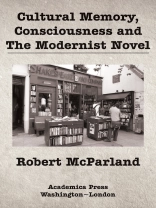Cultural Memory, Consciousness, and the Modernist Novel is a study of the novel and consciousness in James Joyce, William Butler Yeats, D. H. Lawrence, and Virginia Woolf. This volume focuses on novels of the 1920s and engages in a study of Joyce’s epiphany and language play, Yeats’s esoteric philosophy, Lawrence’s vitalism, and Woolf’s stream of consciousness techniques. In this book readers enter the minds of Joyce’s characters Stephen Dedalus and Leopold Bloom in the modern city, the esoteric quests of William Butler Yeats, the vitalism and explorations of D. H. Lawrence, the interiority of Virginia Woolf, and the artistic perspectives of the Bloomsbury Group.
Within the field of intellectual history, Robert Mc Parland’s groundbreaking study places Joyce, Yeats, Lawrence, and Woolf within the cultural and historical context of the first half of the twentieth century. Mc Parland takes a philosophical humanist approach to the innovative techniques and quests of literary modernism and draws from the phenomenology of Edmund Husserl and Maurice Merleau-Ponty, as well as the inquiries of Arthur Schopenhauer and Henri Bergson. This work also follows from the work of intellectual historian H. Stuart Hughes, the studies of James Joyce by Richard Ellmann and Helene Cixous, and David Lodge’s Consciousness in Fiction.
เกี่ยวกับผู้แต่ง
Robert Mc Parland is professor of English and chair of the Department of English at Felician University. His books include Beyond Gatsby: How Fitzgerald, Hemingway, and Writers of the 1920s Shaped American Culture, Citizen Steinbeck: Giving Voice to the People, From Native Son to King’s Men[these could, alternately be enclosed in quotation marks and kept italicized]: The Literary Landscape of 1940s America, and Bestseller: A Century of America’s Favorite Books.












